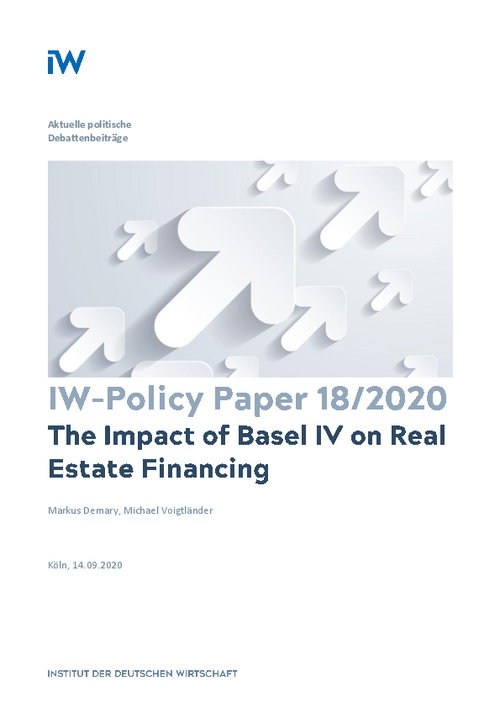The new bank regulations generally summarised as Basel IV include the introduction of an output floor. This means that banks are allowed less deviation from standard approaches when using internal models.

The Impact of Basel IV on Real Estate Financing
IW-Policy Paper

The new bank regulations generally summarised as Basel IV include the introduction of an output floor. This means that banks are allowed less deviation from standard approaches when using internal models.
This change will have far-reaching consequences. According to estimates by the European Banking Authority (EBA), German banks alone will have to increase their minimum capital requirements by around 20 percent; overall, Basel IV will increase capital requirements by 38 percent in Germany and by an average of 26 percent across the EU.
Banks are therefore facing major challenges. Due to the difficult economic situation, they cannot realise capital increases simply by withholding profits or through obtaining increased capital from investors. It is therefore likely that they will become more involved in government financing, since this does not require equity investment, and similarly likely that they will use their remaining equity primarily where they can achieve the highest margins, i.e. with relatively risky financing. In addition, securitisation and cooperation with credit funds are also becoming more likely, which means less transparency, along with more risk being shifted to the shadow banking sector. For borrowers, the reforms could go hand in hand with higher interest rates.
These high costs are not offset by social advantages, since lending in the countries particularly affected by the reforms is relatively prudential. Overall, it is therefore advisable not only to postpone the reforms in their current conception, but to fundamentally reconsider them.

Markus Demary / Michael Voigtländer: The Impact of Basel IV on Real Estate Financing
IW-Policy Paper

More on the topic

The Energy Dependence of Bank Loans
Russia's war against Ukraine has highlighted the vulnerability of the Federal Republic of Germany to Russian energy imports, especially natural gas.
IW
This time is different but still risky: Banking crisis instead of financial crisis
The current crisis of some American and European banks inevitably triggers fears that an international banking crisis could lead to a new financial crisis. But things in 2023 are very different from those in 2007.
IW